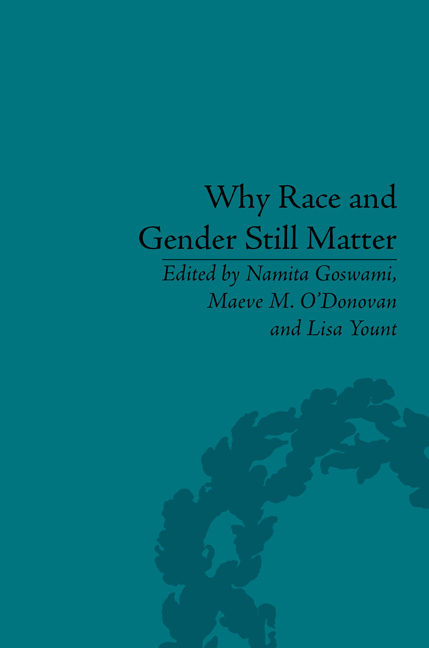Book contents
- Frontmatter
- CONTENTS
- Dedication
- Acknowledgements
- List of Contributors
- Introduction to Why Race and Gender Still Matter: An Intersectional Analysis
- Part I Defining Intersectionality
- Part II Doing Intersectionality
- 6 Continental Feminist Philosophy Meets Intersectionality: Rosi Braidotti's Work
- 7 Purposeful Nonsense, Intersectionality and the Mission to Save Black Babies
- 8 Transitional Subjects: Gender, Race and the Biopolitics of the Real
- 9 Caster Semenya: Reasoning Up Front with Race
- 10 Philosophical Happiness and the Relational Production of Philosophical Space
- 11 Theory Can Heal: Constructing an Ethos of Intervention
- Notes
- Index
10 - Philosophical Happiness and the Relational Production of Philosophical Space
from Part II - Doing Intersectionality
- Frontmatter
- CONTENTS
- Dedication
- Acknowledgements
- List of Contributors
- Introduction to Why Race and Gender Still Matter: An Intersectional Analysis
- Part I Defining Intersectionality
- Part II Doing Intersectionality
- 6 Continental Feminist Philosophy Meets Intersectionality: Rosi Braidotti's Work
- 7 Purposeful Nonsense, Intersectionality and the Mission to Save Black Babies
- 8 Transitional Subjects: Gender, Race and the Biopolitics of the Real
- 9 Caster Semenya: Reasoning Up Front with Race
- 10 Philosophical Happiness and the Relational Production of Philosophical Space
- 11 Theory Can Heal: Constructing an Ethos of Intervention
- Notes
- Index
Summary
This essay draws on the work of contemporary theorists Sara Ahmed and Aimee Carrillo Rowe to argue the following: legitimated philosophical spaces are affectively and relationally produced, and they are possessively invested in what I am calling philosophical happiness. Philosophical happiness is a kind of ongoing contentment and comfort with and in philosophy. Such happiness may manifest from a sense of belonging within philosophy and a consistent sense of pleasure doing philosophy. Perhaps doing philosophy involves publishing in the field, teaching the field and one's specialization in it. Philosophical happiness may also emerge from preserving the field within one's institution. Pairing the adjective ‘philosophical’ with the noun ‘happiness’ is a move to claim the otherwise delegitimated role of affect, emotion and belonging in both the history of philosophy and its contemporary practices. I am arguing that affect and concern for belonging is smuggled into philosophy by those who claim that these are illegitimate concerns for philosophy. While we may not want certain affects or desires informing our professional spaces, we cannot ask after their appropriateness if we pretend that they do not inform and, in fact, produce our spaces. In the latter part of the present essay, I focus in on how the production happens and is maintained and reproduced.
In The Cultural Politics of Emotion, Ahmed argues that affect's denigration in the history of philosophy makes it all the more immanently important to the history of philosophy.
- Type
- Chapter
- Information
- Why Race and Gender Still MatterAn Intersectional Approach, pp. 157 - 178Publisher: Pickering & ChattoFirst published in: 2014



